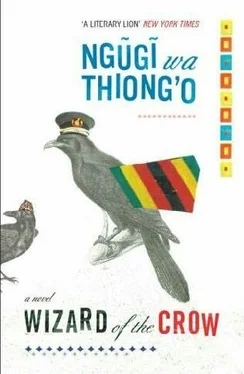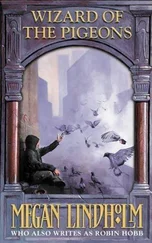A record of the Ruler’s illness exists in a paper by the distinguished Harvard professor Din Furyk. The professor had hoped to read it at the annual conference of the Euro-American Medical Association and duly sent them an abstract, but the description of the illness sounded so unbelievable that he was not allowed to present it. The professor did not give up. He sent the paper to a famous journal in England, Nature & Nurture, and on reading it the editors who earlier had shown interest in it changed their minds. They said that since the illness in question involved the head of state of a friendly country, the publication of the paper would almost certainly strain the relations between Britain and Aburlria to the detriment of cooperation between the two countries in matters of science and technology. Another journal returned the paper to the author, recommending instead a disreputable publisher of science fiction!
A copy of the professor’s diary in which he describes how he came to write the paper fell my way, and I will draw on it freely to supplement my other sources.
It seems that the Ruler’s body had started puffing up like a balloon, his whole body becoming more and more inflated, without losing the proportion of parts.
Dr. Wilfred Kaboca, the first to examine him, immediately called for Machokali as a witness to his dealings with the sick man. Ma-chokali in turn called in all the other ministers, including security personnel, who stood around flabbergasted at the uncanny sight. Not only did the Ruler seem on the verge of bursting, but he had also lost the power to speak.
The ministers retreated to a meeting to plan how to deal with the Ruler’s illness and the multitude of problems it generated. Where would they put him?
He would sit and sleep on the floor, it was decided. What would he wear? As his hypertrophy proceeded, his clothes were ripping at their seams; the Ruler appeared to be dressed in rags. They covered him in bedsheets. But what to do about the Ruler’s unrelenting inflation? How to stop it, how to slow it down?
Dr. Wilfred Kaboca had tried everything within his knowledge and experience to contain the process but had now reached the end of his tether.
Should they take him to a hospital? they debated time and again. But how to prevent the news from spreading? They authorized Dr. Kaboca to seek the help of a specialist willing to apply himself only in the Ruler’s suite. Dr. Wilfred Kaboca contacted Dr. Clement C. Clarkwell, a New York specialist in obesity and the like, but when Clarkwell saw the body visibly expanding before his very eyes, he dialed Professor Din Furyk for help.
“I came to know about the illness,” writes Din Furyk of the Harvard Medical School in his diary, “because Dr. Clarkwell was a former student and whenever he came across difficult cases he would often call me for advice. His description of this particular case so aroused my curiosity that I dropped everything and went to New York. I was taken past security right to the Ruler’s suite, the top three floors of the Fifth Avenue VIP Hotel, where I quickly consulted with Dr. Clarkwell and Dr. Kaboca, and the gravity of the situation was accentuated by the shaking of their heads from side to side in disbelief saying that, according to the preliminary exam, everything about the Ruler, except for his swelling up, seemed normal. I entered the Ruler’s room. I would ask other questions only after I had seen the patient.
“The patient was seated on the floor, his back to the wall. I felt his forehead, took his temperature, listened to his heartbeat. All was normal, though he seemed to be panting a bit from fatigue. But his eyes, those eyes, I have never encountered a look like that in an adult. They looked scared and helpless, like the eyes of a child stricken with fear at the unexpected and the unknown.
“The Ruler, as his followers invariably called him, seemed to have lost the power of speech. Fortunately he could still read what was put in front of him and he would then nod for yes or shake his head for no. But even these gestured yeses and nos were rare and rather abrupt.”
Din Furyk tells of how he asked for blood samples to be taken to find out whether the patient exhibited symptoms of hyperthyroid-ism, nephrotic syndrome, polycystic kidney disease, or some form of Cushing’s syndrome brought about by cortisal hormones in the blood, or any disorders associated with obesity known to science. He was also concerned about the possibility of steroid-induced obesity, despite Dr. Wilfred Kaboca’s assurances that the Ruler had never taken any steroids, that Viagra was the only drug for which he had shown an insatiable appetite.
Furyk then describes his attempts to get a sense of the Ruler’s medical history from his entourage of ministers and security folk. “No one was able to shed any light on the matter. When I asked them a question, such as When did the illness strike?’ or When did you first notice signs of the illness?’ they would look in the direction of the Ruler, then at one another, and would say that they did not know. Africans, or shall I say black people, in general, are strange.”
At this point the professor digresses to discuss the African character. The diary is full of phrases like “faces that cannot be easily read,” “a face like a mask,” and “the ministers could not look me in the eye; they had a shiftiness suggesting mendacity.” The Ruler’s own personal physician is also questioned, and he is described as being no different from the ministers, volunteering bits of information grudgingly and only when he was outside the hearing of others.
The only person praised in the diary is the Minister for Foreign Affairs, Mr. Machokali, who spoke without an accent and was direct in his manner. He was presumed to have been educated in the West. “A rare mind, this, quite exceptional. Could easily have been a product of Harvard or another Ivy League school.”
“Because they were all hopeless,” Professor Furyk writes, “I thought it better simply to wait for the results from the lab.
“Imagine my shock when they showed that everything about him was functioning normally! How was this possible? Why this continued self-induced expansion of the body? His belly was as taut as a drum, and whenever I tapped it a sound issued from the mouth. Crr, or was it coral or crawl or cruel”? I took Dr. Clarkwell and Dr. Kaboca outside for a conference. What could the Ruler be signifying by coral or crawl or cruel? Dr. Kaboca’s response was strange: he was a physician of the body, not a decipherer of words; it was better to ask the ministers because they were politicians and politicians are known for their words.
“I confronted the ministers. All turned their eyes to Machokali.”
Machokali himself flinched inwardly. It was bad enough to have this case, of a body spluttering meaningless words, on his hands. Now he had to deal with accusatory looks: You arranged this visit; get us out of this predicament. How did he, a highly educated individual with a BS in economics from the University of Aburlria, an MA in political science from Michigan University, and a PhD in the psychology of power from Uppsala University in Sweden, find himself in this mess?
He needed to buy time. So he said at the meeting that he needed to go back to the Ruler to elicit more words that might help him to interpret the three words. As soon as he got new information, he would convene another meeting.
So with a boldness he did not feel, Machokali marched into the Ruler’s room and said only, “How are you!” The Ruler stared blankly past him as if he had not seen him or heard his greetings. So Machokali backtracked, and as soon as he was outside the room he darted to his own room, locked himself inside, and knelt down to pray for divine intervention.
Читать дальше












